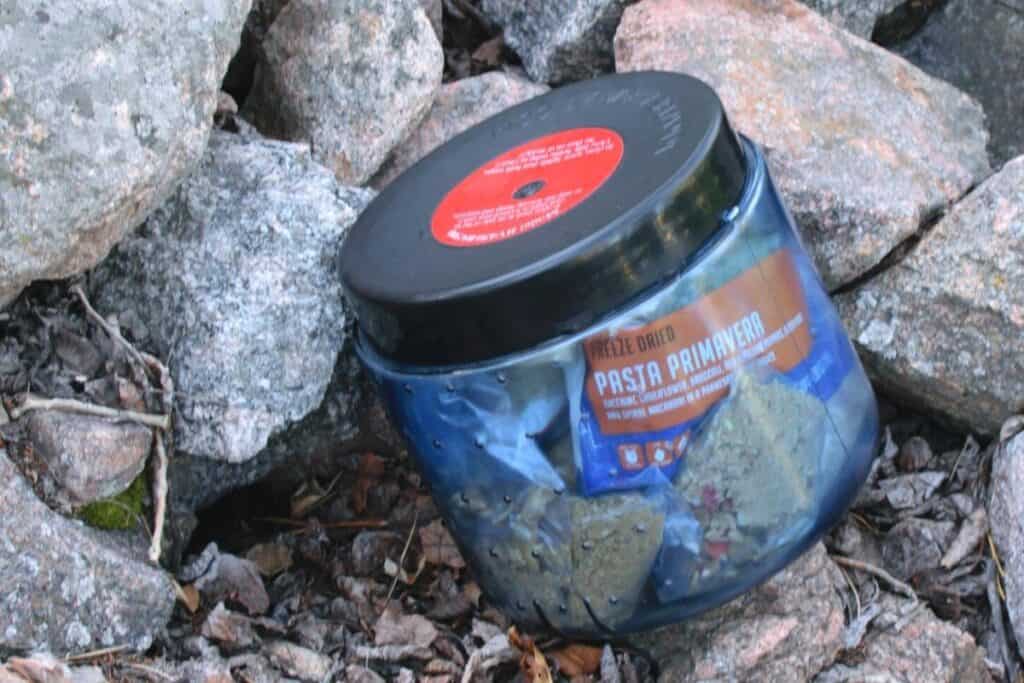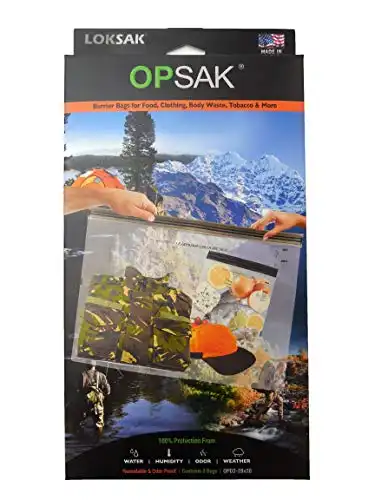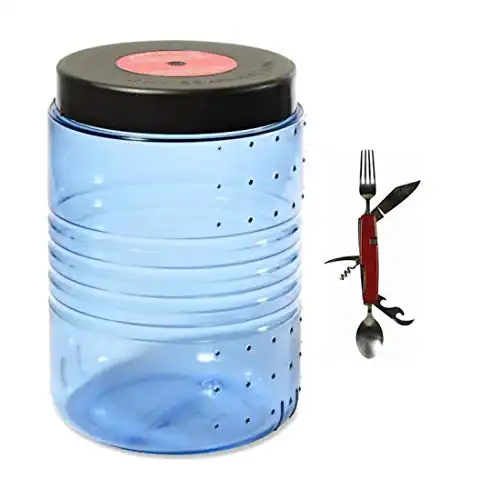
If you’ve ever been on a camping or backpacking trip to an area with active bears then you’re probably with the requirements to secure your food using a bear canister. While these cylindrical containers are great for storing your food, you may find yourself wondering if bear canisters are smell proof?
Bear canisters provide a safe place to securely store food but they are not smell proof. This is why it is recommended that they be stored at least 100 feet from your campsite. They should be combined with odor barrier bags when if true odor-proofing is needed.
While the short answer is no, there are steps you can take to minimize your smells!
Bear Canister Smell Proofing
The answer to “are bear canisters smell-proof?” is, unfortunately, no. Bear canisters are not so insulated as to eliminate all odors that might attract attention from wild animals like bears.
Their prime purpose, after all, is to protect your contents from being eaten or otherwise ruined by the prying claws of a bear. That’s pretty important during a camp, especially if you’re out in the wilds for multiple days.
Some canisters advertise themselves as being odor-resistant, but it’s best to assume that a bear may still be able to smell whatever is being stored. After all, it’s better to be safe than sorry when you’re out by yourself in the wilderness.
Fortunately, there are other ways you can minimize the scents of your food and snacks while you’re out camping. We strongly suggest you take the following tips to heart, not only to keep your meals from being eaten but to protect everyone at the camp itself!
Can Bears Smell Vacuum-Packed Food?
Bears may have an incredible sense of smell, but that doesn’t mean they can smell through vacuum-sealed bags. In fact, that’s one of the best ways to ensure your goods don’t draw bears to your camp!
We think it’s safest to not only keep your bear canister far from your camp itself but to use vacuum seals when possible. You’ll keep your snacks and meals safer if pests aren’t drawn to them.
Not only that but you’ll be safer yourself if you don’t draw wild animals towards your campsite. Bears are dangerous, but other forms of wildlife can be just as risky too.
How to Reduce Bear Canister Smell
Bears have an exceptional sense of smell. No matter what, it’s best to err on the side of caution when bringing food or other odor-heavy contents into the wilderness, but especially any area where bears live.
One of the most effective techniques to minimize your exposure is to house any odor-rich items, such as food or toiletries, in high-grade smell-proof bags. These bags (great one here) are designed to odor-proof their contents and can even be used as a liner inside.
OPSAK bags are an enhanced aLOKSAK, as they are not just waterproof but also odor and vapor proof! So if you're going camping, you will sleep peacefully knowing your food is stored in “bear-proof”, state of the art storage bags.
Look to products that have been clearly certified as odor-proof by the Interagency Grizzly Bear Committee, which is an organization of federal, state, and tribal agencies. This way, you can rest assured that you’re getting something that you can rely upon when you’re in bear territory.
Once you’ve packed your contents, the bags should be layered by day rather than food groups. This way, you minimize spreading smells and are less likely to spill something, thus attracting bears.
Avoid touching bags if your hands have been in contact with anything odiferous, and make sure that the bags do not come close to items that could give off an odor. Otherwise, you run the risk of your canister being discovered.
None of these measures is a guaranteed solution to keep bears away. With that in mind, it’s prudent to place your canister at least 100 yards away from your camp.
Try to choose somewhere that is downwind from your campsite and in a place that has no water sources, slopes, cliffs, or inclines that a bear could roll a canister down.
Ultimately, bears will always be drawn to smells, so try to prepare and eat your food where the canister is located. Doing so can minimize the potential that a bear gets inadvertently lured to your camp itself.
What Are Bear Canisters?
To put it simply, bear canisters are tightly sealed canisters campers use to keep their perishable goods safe.
They reduce the smell of food and keep pests out of your lunch or dinner!
Why Bear Canisters Are Necessary
They’re not only a great means of keeping your food ant-free, but bear canisters are actually necessary to keep bears at bay.
Bears have an acute sense of smell. In fact, bears rely on their sense of smell just as much as their eyesight to understand the world around them.
These canisters help to keep any smells from reaching bears. They aren’t perfect and won’t stop every smell, but they help to minimize the scent of your food and other goods.
If possible, it’s best to avoid bears by any means possible. While they don’t attack people frequently, they are still very dangerous creatures.
If you happen to stumble across a black bear (the most common in the United States), try to make yourself as large and loud as possible. Your best bet is to scare it off rather than risk fighting it.
Plus, bear canisters don’t just minimize smells. They will protect your belongings in case a bear does stumble across them! They’re designed to be sturdy, so they can take a bit of a beating if a bear tries to get at your goods.
Camp without worry with the Bear Vault Bear Resistant Food Container. These lightweight canisters are super rugged and can hold up to 7 days worth of food. The polycarbonate material resists shattering upon impact, which adds to the durability of this container.
Not only that, but because of the way they can be sealed, they’ll keep bugs and other critters like raccoons out of your things.
What to Put in Your Bear Canister
You may be surprised to hear that it isn’t just your food that you need to worry about when you’re out camping. Anything that has a strong scent needs to go into the canister.
Depending on how much you bring, you may need more than one canister. After all, canisters aren’t as flexible as bear bags, and they might not be able to hold as much due to their rigid shape.
Things you will want to consider putting into your canister are:
- All sealed or packaged foods
- Pet food and treats
- Any sunscreen or lotions
- Soap, shampoo, conditioner
- Bug repellent
- Deodorant or antiperspirant
- Vaseline or lip balms
- Any medications you need
- Feminine hygiene products
- Toilet paper, if it’s infused with something like shea or aloe
- Trash that may attract pests especially used food bags
As a general rule of thumb, if a product goes on or into your body, it needs to go into the bear canister. You may think that your unscented lip balm won’t draw attention, but it really could.
It’s always better to be safe than risk a bear encounter. Yes, they will most likely leave you alone as all a bear really wants is to find some easy food, but you never know what will happen with a wild animal. It’s smarter to take no chances.
Summary
Every camper needs a bear canister, no matter how safe you think your campsite is. The larger the group you have with you, the more canisters you will need, but they aren’t the only protection you should take.
Don’t forget to put food and toiletries into your bear canister and to always use scent-proof bags (or at least vacuum-sealed) in addition to the canister itself.
Bears don’t want to hurt anyone. They just want a nice snack, and your shampoo might smell like honey or fruit. To keep everyone safe, including the wildlife you’re hoping to enjoy, minimize the smells you bring with you as much as possible.
Related Articles
If you found this article helpful, then make sure to take a look at some of these related posts as well!


